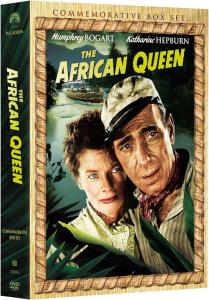Review of The African Queen, Directed by John Huston
Not all movies are deep and profound, but I do expect “classics” to have something to say. Movies become “classics” because they are more than mere entertainment; they are supposed to speak to something higher or deeper; to hide nuggets of wisdom; to hold lessons about the nature of humanity, right? Their enduring power to bring a smile to your face is really beside the point. Understanding why classics are so Important and Deep is such hard work, in fact, that they’re often not much fun at all.
If that’s what a classic is, then The African Queen (1951) is no classic. It’s just a fun movie that is somehow still entertaining more than 60 years after it was made.
Director John Huston and Humphrey Bogart collaborated on six movies together, of which the most famous were The Maltese Falcon (1941), Treasure of Sierra Madre (1948), and The African Queen. All three are on AFI’s list of top 100 films—the last is number 65—and the three were nominated for a bunch of Oscars. Bogart won his only statuette for The African Queen—beating, implausibly, Marlon Brando in A Streetcar Named Desire—for playing a character as far removed from Casablanca’s Rick Blaine as possible.
The African Queen follows Rose (Katherine Hepburn) and Charlie (Bogart) as they boat down a river in Africa on a hair-brained scheme to find and sink the only German warship on the continent, this being the outbreak of World War I. That’s just the backdrop, of course: the movie is a zany love story between a high-born, well-bred lady accustomed to command and a drunken, vagabond river-boat captain who can fix anything.
Bogart, whom most of us know from his world-weary, chain-smoking persona in Casablanca, here plays Charlie as a silly, gin-soaked, love-struck overgrown boy. His performance verges on overwrought. In the scene after he and Rose first declare their love for each other, Bogart literally bounces around the boat imitating the river’s hippopotami and monkeys: I couldn’t decide if Bogart was drunk, courageous, or on the losing end of a bet.
The movie has some effective moments—a drunken love quarrel, an encounter with leeches, a close-up of Bogart’s sweat-and-mud smeared face and he drags the boat through swamp and reeds, and a moment of complete despair as the lovers give themselves up for lost. It has some pretty ineffective moments, too. The movie tries to feel like an action movie by including white-water rapids and an encounter with a military post overlooking the river. Both sequences might have been gripping for 1951, but they fall flat today.
Truth be told, the movie did give me something to think about. Several things, in fact. First, the love of a woman will make a man do anything. Rose is the real motivating force in the pair’s long-shot quest to cross a continent and challenge a warship; Charlie keeps telling her everything is impossible before he does it all out of love for her. Second, patriotism helps us achieve great things, and British pluck and American ingenuity will always triumph over German efficiency (this movie being made shortly after World War II). There is not even a hint of embarrassment, irony, or subversion in the movie’s simple-hearted portrayal of Rose’s dedication to her country’s cause. I generally like patriotism, although I recommend you read Coyle’s helpful reminder of the need to have a little distance from our earthly communities.
Third, the movie captures the religion of Hollywood romanticism perfectly. When the pair give themselves up for dead, Rose bows her head and prays. She asks for God’s mercy, and pleads “Judge us not for our weaknesses but for our love, and open the doors of heaven for Charlie and me.” In Hollywood, our love for each other makes us pure in the sight of God. It would be beside the point to complain about the obvious theological problems here: you couldn’t actually expect orthodoxy in a mainstream movie. And at least the movie shows a character praying. Praying with sincerity and simplicity, not being mocked by another character, and, in fact, being followed by a miracle in the next scene.
Lastly, I was struck by the ending of the movie. I went into it expecting a serious drama (it starts off on a pretty somber note), so as the film progressed I naturally assumed Charlie would end up dead, having heroically sacrificed himself for Rose and her mission. His character arc would only be satisfying if he ended up a martyr. But the movie is actually a comedy, and [spoiler] they end up married instead. It is interesting that my sensibilities have been so shaped by modern Hollywood that I simply assumed a good movie was a dark movie; that a classic must be tragic; that happy endings are shallow. How times change. Once upon a time, the most profound stories were the ones with happy endings; that is, after all, the true story of the universe. Perhaps The African Queen is a sort of American version of Dante’s Divine Comedy, in which Rose is the Beatrice to Charlie’s Dante, leading him through the hell of the river to the bliss of marriage and peace at the end. So perhaps The African Queen is a classic after all.










